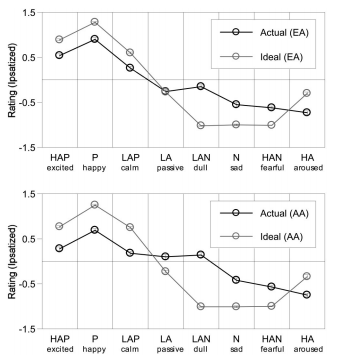Article 01: Cultural Variation in Affect Valuation
Affect Valuation Theory:
- Proposal: Ideal and Actual affects differ, and cultural factors have a bigger influence on the ideal compared to the actual
Definitions:
- “ideal affect”: how people want to feel
- “actual affect”: how people actually feel
- HAP, LAP: high, low arousal positive states
- Culture: operationzalied as country-of-origin
- Emotions: only the affective and affective states are observed in this study (although its only considered one aspect of emotions in Emotional Psychology)
Ideal Affect Differs from Actual Affect:
- emotional experience expressed through: valence (positive/negative) and arousal (calmness/excitement)
- pure and interactive component (overlapping/non-overlapping variance between ideal and actual affects)
Study 1:
- Hypothesis: Ideal affect is different across different cultural constructs
- Particpants chosen were either European American (EA) or Asian American (AA) students
- Participants were asked to complete surveys to determine their “Affect Valuation Index” (AVI), self-construal (individualistic or collectivistic natures)
- Results: EA students seemed to favor HAP compared to AA students

Study 2:
- Conducted the same experiment as Study 1, except with Chinese students from Hong Kong (CH).
- Included temperament, infulence/adjustment goals, and personality traits in the survey
- Results: CH students valued LAP, EA valued HAP, and CA valued both. EA students not achieving their HAP led to higher depressions scores.
Summary: personality explains actual affects, while culture influences pure ideal affects.
Personal Thoughts and Reflections:
- EA’s value high-arousal positive affects, while CH/AA value low-arousal positive affects; this can be tied into differences of ‘self-concept’ between cultures (EA’s value more indivuality, CH/AA value self-concepts regarding social roles)
- From Pyschology of Personality, culture was rather a strong influencer on a person’s “self-concept”, where East Asian cultures led to self-concepts pertaining to “social roles”, and Euro-American leading to more individualistic. The different self-concepts affected how people apprasied and reacted (emotionally) to different situations. So differences in emotional affects could rather be a byproduct from personalities influenced by cultures, as opposed to directly influenced by the culture.
- From Pyschology of Personality, higher depression scores were due to having poorer social goals, which stems from EA’s more individualistic definition of success.